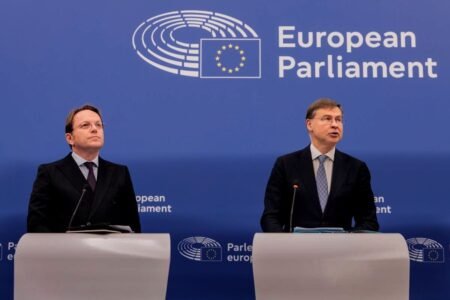The European Commission adopted on 30 November a new EU Global Health Strategy to improve global health security and deliver better health for all in a changing world.
Advertisement
Why do we need a new Global Health Strategy?
The experience of recent years, particularly since the COVID-19 pandemic, has highlighted as never before that health has no borders. The well-being and lives of citizens, the prosperity and stability of societies and economies, and sustainable development, all depend on addressing health from this perspective.
Global health has once again become a priority, with new challenges and a complex geopolitical context but also with new opportunities in areas such as research or digitalisation. A new Global Health Strategy is needed to provide a new, coherent, effective, and focused EU health policy that reflects these rapidly evolving circumstances.
The challenges we face are significant. There is a massive unfinished agenda in global health and progress towards the health Sustainable Development Goals has even reversed in many countries. At the same time, it is essential to strengthen global health security swiftly and comprehensively, to better prevent future pandemics and other threats and to increase resilience.
The EU’s leading role in fighting the COVID-19 pandemic has shown that it can make a major contribution to global objectives with the Team Europe approach.
Why is a stronger coordination in the EU essential for the Strategy to succeed?
Achieving this Strategy’s goals requires more coordination between the Commission, the Member States, and partners, for two reasons:
- First, global health is increasingly shaped by many policies (such as climate, environment, energy, nutrition, food security, social protection, demography, education, research, humanitarian assistance, finance, trade, industrial or foreign and security policy) that either affect health or enable solutions to tackle health challenges. Achieving the priorities of this strategy and implementing a true ‘health in all policies’ governance – a novelty of the strategy therefore calls for improved coordination between everyone involved.
- Second, the nature of the challenges we face requires an important collective effort by the EU and its Member States. This can only happen if we build further on the Team Europe approach to build a single, powerful voice. This includes ensuring synergies between national and EU global health strategies, and a close coordination with Member States so that political action and financial resources are closely linked to the new priorities.
In the second half of 2023, and in the spirit of Team Europe, the Commission will set up a coordination system with EU Member States to ensure a powerful EU voice and leadership in global health.
How will the new strategy help mitigating the risk of a new pandemic?
The strategy aims to help mitigate risks of a new pandemic at different levels and different scales.
- First, we will fight health threats more comprehensively at home. This will be made possible by the new cross-border health threats regulation, and the stronger mandates of the European Centre for Disease Prevention and Control and the European Medicines Agency. The work of the new Health Emergency Preparedness and Response Authority (HERA) in the areas of vaccines and other medical countermeasures will also be crucial, as well as a One Health network to act against all pathogenic threats with integrated surveillance.
- Second, we will fight current and future health threats abroad with a new focus on more equity in the access to vaccines and other countermeasure by boosting local manufacturing capacities and strengthening health systems. The “One Health approach” will be followed to tackle the complex interconnection between humanity, climate, environment, and animals. The Strategy also supports more effective disease surveillance worldwide and stronger international rules and cooperation mechanisms on health.
- Third, through stronger partnerships with partner countries and strengthening regional capacities, the strategy aims at enhancing the power of networks for health security.
- Fourth, the Strategy calls for engagement at the global level through global joint endeavours. This includes a strong engagement in the Pandemic Fund as founding donor and key actor in the board, a strong involvement in the negotiations of a future pandemic agreement and the revision of the International Health Regulation.
How will the strategy improve equity, including in vaccines?
The global response to the pandemic has taken place in record time thanks in no small measure to EU leadership in the development, production and distribution of vaccines, which have been exported to partners across the world. Nevertheless, more equity is still required in the development of and access to vaccines and other countermeasures. We can also not wait for the next “pathogen X” to strike before preparing ourselves. The Strategy therefore proposes the establishment of a permanent vaccine and countermeasure platform that would draw on the experience of ACT-A and other instruments to improve equity.
Supporting the expanded uptake of vaccines against childhood illnesses, and increasingly supporting adult health will continue, including through a strong support to Gavi, the Vaccine Alliance that works to increase equitable and sustainable use of vaccines. The Strategy will ensure that innovative vaccines, treatments, and diagnostics are developed and used. It will work towards building effective, resilient, and accessible health systems in all their fundamental aspects (health workforce, health information systems, access to essential medicines, financing, and leadership/governance). And the Strategy will advance equitable universal health coverage.
Improving capacities for pandemic prevention, preparedness and response and detection of health threats is key to decrease threats globally. This will be done by supporting regional and national efforts to strengthen pharmaceutical systems and manufacturing capacity for vaccines and other medical products and technologies to increase quality, safety, equitable access, and health sovereignty.
The EU will invest in strengthening health commodity markets and supporting procurement systems and supply chain management, including transparency and monitoring, using inter alia business support networks to favour matchmaking, facilitate marketplace exchanges and dialogue of industrial actors.
How will the EU exercise leadership in global health?
The EU has played a key role in the fight against the COVID-19 pandemic globally through the Team Europe approach. Strengthening this EU leadership is essential to boost the impact of our collective contribution to global health and to shape a new global health order based on fundamental values. This calls for closer coordination, facilitating decision making through the established statutory channels.
Building on ideas from EU Member States, this strategy suggests practical ways to improve coordination. This includes, facilitating information and intelligence sharing among the EU and Member States and strengthening upstream coordination among Member States in G7, G20 and OECD forums. Alliances should be built to ensure EU views are heard in international organisations. Synergies should be ensured between national and EU global health strategies, strengthening external communication with ‘Team Europe’ as the default approach’.
How will the strategy be financed? Will there be any new money to implement the strategy?
The ambitions of this strategy require important political and resource commitments globally. Effective funding is therefore a key element of the strategy. Together, the EU and its Member States are among the largest funders of global health whether in terms of financing global goods (financing international organisations and global health initiatives), development aid, or humanitarian assistance. The EU financial contribution will mainly come from the NDICI Global Europe and EU4Health budgets, but also from others such as third programme of the European and Developing Countries Clinical Trials Partnership (ECDCP3) through a health in all policies approach.
The Strategy encourages the use of innovative financial instruments and builds on the European Fund for Sustainable Development Plus (EFSD+) which facilitates access to blended finance and budgetary guarantees. A specific window on human development under the EFSD+ open architecture provides opportunities to leverage further investment in health.
Together with the European Investment Bank and the European Bank for Reconstruction and Development, the Commission intends to develop a framework for global health financing. This should be aligned with our priorities and those of our partner countries, and encourage participation of private investors where relevant.
The Strategy prioritises co-investment initiatives with local partners, and pooled financing with other international stakeholders. The Commission will also help mobilising domestic resources in partner countries.
The Commission will advocate for increased accessible finance for countries through multilateral development bank lending and for increased sustainable finance, for example through special drawing rights on lending to contribute to the International Monetary Fund (IMF) Poverty Reduction and Growth Trust and the IMF Resilience and Sustainability Trust.
Together with Member States, the EU will promote new financing methods, including debt swaps or loan buy-downs to convert debt into investment in health system reforms and new life-saving programmes.
How will the strategy use digitalisation to meet health goals?
Digitalisation is a fundamental enabler to delivering better health for all. This is why we propose a digital action for global health, tackling three key areas.
- With a Team Europe initiative on digital health, the strategy will tackle underinvestment in digital health and care in low- and middle-income countries. This will improve universal health coverage, primary healthcare, pandemic preparedness and response, improved diagnosis and personalised medicine and ensure a continuum of care. The Strategy will also support the establishment of national and regional strategies such as the upcoming African Union/African CDC digital health strategies.
- Building on the EU’s pioneering efforts in the regulation of health data or digital certificates, the EU will use the potential of health data worldwide in line with the principles of the planned European Health Data Space. It will foster the use of new technologies, including artificial intelligence, to improve diagnosis and treatments worldwide.
- The Strategy will help shaping the digital health ecosystem globally (rules, norms, standards, interoperability), using – where appropriate or relevant – European examples and best practice like the EU Digital Covid Certificate, and supporting international rules that are compatible with the EU framework and facilitate person-centred health data governance and protection.
How will the strategy tackle the issue of workforce imbalances and skills?
Through a health workforce action, the strategy will address both the necessary development of skills and the challenge of shortages. Building on its experience supporting country partners to develop human resources, this will require a long-term, integrated approach and cooperation between countries. It is important to acknowledge as well that problems are more acute for the nursing and care sectors, and that they disproportionately affect women in most environments.
The action will improve international cooperation and promote adherence to international commitments. It will develop reliable monitoring and data collection, boost vocational education and training and foster mutually beneficial mobility arrangements with partners in a context of workforce shortages. Partner countries will be supported in training, recruiting, and employing healthcare workers.
How will the new strategy promote international cooperation and health sovereignty in partner countries?
Our international partnerships will be expanded under Global Gateways, promoting co-ownership and co-responsibility towards health sovereignty for more resilience and autonomy. A good example of this are the Team Europe initiatives on local vaccines manufacturing and access in Africa but also now in Latin America and the Caribbean, which contribute to our partner countries’ self-sufficiency and autonomy in pharmaceutical manufacturing supporting existing regional efforts.
The partnerships will focus especially on those countries and communities that are most in need, where we assess that our engagement can achieve the highest impact in terms of addressing health equity and improving health outcomes and well-being.
How will the strategy support WHO to step up its leadership of the global health community?
Global governance will require new focus to maintain a strong and responsive multilateral system, with a WHO at its core which is as sustainably financed as it is accountable and effective. Consensus should be built through deepened cooperation through G7, G20, and other global, regional, and bilateral partners.
The pandemic has highlighted that we need a stronger global system of institutions and actors to ensure global health security. The first lesson is that the indispensable institution at its core – the WHO – must be strengthened. The strategy supports a more sustainable WHO financing, advancing WHO reforms to strengthen its governance, efficiency, and increasing its accountability. The strategy also aims to strengthen the WHO’s focus on its role to negotiate and oversee global health rules and procedures, In the context of this strategy, the EU aims to enhance cooperation with WHO, seeking formal observer status with full participation rights.
The EU should drive the essential process of filling the existing gaps in global governance. These gaps include the lack of comprehensive pandemic rules, the need to build a permanent platform to handle the development and access to vaccines and other countermeasures for any future pandemic, the need to have a permanent link between global health and financial resources, and a sustained attention by top political leadership. Consensus should be built on these issues by a stronger cooperation at the G7, G20, and other global, regional, and bilateral levels.
What is the One Health approach?
One Health recognises that the health of humans, domestic and wild animals, plants, and the wider environment (including ecosystems) are all closely linked and inter-dependent. On Health therefore follows an integrated, unifying approach that aims to sustainably balance and optimise the health of people, animals, and ecosystems.
In other words, One Health is an integrated, unifying approach that aims to sustainably balance and optimise the health of people, animals, and ecosystems.
One Health mobilises multiple sectors, disciplines, and communities to work together. Together they can more effectively foster well-being and tackle threats to health and ecosystems, while addressing the need for clean water, energy and air, safe and nutritious food, taking action on climate change, and contributing to sustainable development.
Only through this approach will we be able to combat health threats comprehensively.
What is the ‘health in all policies’ approach?
‘Health in all policies’ is an approach for public policy making. When policies are developed this approach systematically takes into account the health implications of these policies. It seeks synergies between different policy fields and avoids harmful health impacts in order to improve public health and health equity. A health in all policies approach, sometimes also called a “whole of government approach to health”, is an effective way to improve population health and increase health equity.
How will we make our financial support more impactful?
The EU will strive to invest in global health in a predictable and sustainable way commensurate with needs and ambitions. Importantly, results depend on how finance is structured and not just on how much is committed.
To make our investments more impactful, the Strategy prioritises global health across all relevant EU budget financing programmes, including NDICI-Global Europe, EU4Health programme, Horizon Europe, the Instrument for Pre-Accession Assistance and the Technical Assistance and Information Exchange instrument.
The Strategy lives up to the Commission’s commitments to finance global health under the multi-annual financial framework and it seeks to achieve maximum impact by pooling EU and Member State resources with an effective Team Europe approach.
The EU will also request EU Member States to increase financing for global health, prioritise co-investment initiatives with local partners, and pool financing with other international stakeholders. The Strategy advocates to increase accessible finance for countries through multilateral development bank lending and to increase sustainable finance.
Together with Member States, the EU will promote new financing methods, including debt swaps or loan buy-downs to convert debt into investment in health system reforms and new life-saving programmes.
Source: European Commission







